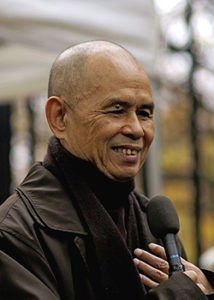On January 22, 2022, one of the most influential Zen Buddhist monks, Thich Nhat Hanh passed away. I recently listened to an interview he did with NPR’s Terry Gross. In the interview it is mentioned that Thich Nhat Hanh started a movement called “Engaged Buddhism”. This movement combines the practice of meditation with anti-war work. Gross mentioned the juxtaposition of the concept of “stillness” associated with meditation with the concept of fleeing in wartime. She asked “Were those two things compatible? Were you able to practice stillness and the ability to run for your life when you needed to?”

In response to this, he said, “That is a matter of training. The practice is in the practice of mindfulness. Mindfulness is the energy that helps you to be aware of what is going on. Like, when you walk, you can walk mindfully. When you drink, you can drink mindfully. And when you run, you can run mindfully.” He also said, “The essential is that you are mindful why you do things, whether you do it slowly or quickly.” It is this quote that caused me to think about my tai chi practice.
Whenever I practice with students who are just starting their journey into tai chi, they are shocked when I refer to the martial arts history of tai chi. Many will wonder how can one use tai chi as a form of self-defense? I have spoken to (and written) at length about the stereotypical view of tai chi: slow movements, graceful motions, dance-like rhythms, etc. Many tai chi teachers I have come across have spoken about the health, moving meditation, and martial arts principles behind taijiquan. Many have told me that they have come across this perception many times.
It is at this point that I think about the words of Thich Nhat Hanh and his notion of “mindfulness.” I feel that when we practice tai chi slowly, we are mindful of our movements. We practice to be aware of each bend, twist, and step. We can turn our mind off and allow our bodies to “feel” the movements (thereby being a form of moving meditation). We can focus on the ward off, fa jin, or strike (thereby focusing on the martial application). No matter what you are looking for, it is important to practice mindfulness. Be aware of your rooting. Can you stay connected with the earth? How do you time your breathing with the movements of your form?
A tai chi practitioner can will practice their forms slow as well as fast. Many may only see the forms done slowly. Using wide/large sweeping movements and moving slow and with great control, may make the form look beautiful. However, with faster expression, whipping movements, and great power, one can see the martial applications in the same form. To watch a great master such as Chen Bing perform a Chen form has both beauty and power.
So, whether one is practicing for meditation purposes, internal health/wellness purposes, or martial arts purposes (or all of the above), it is quite important to be aware of the purpose(s) for your training. Each time I train I may focus on one or two principles that I wish to exercise (or improve upon). No matter if you are moving fast, or moving slow, keep aware of your movements and be in the moment. Train mindfully, friends.
Don’t forget to check out our great training articles!

Leave a Reply